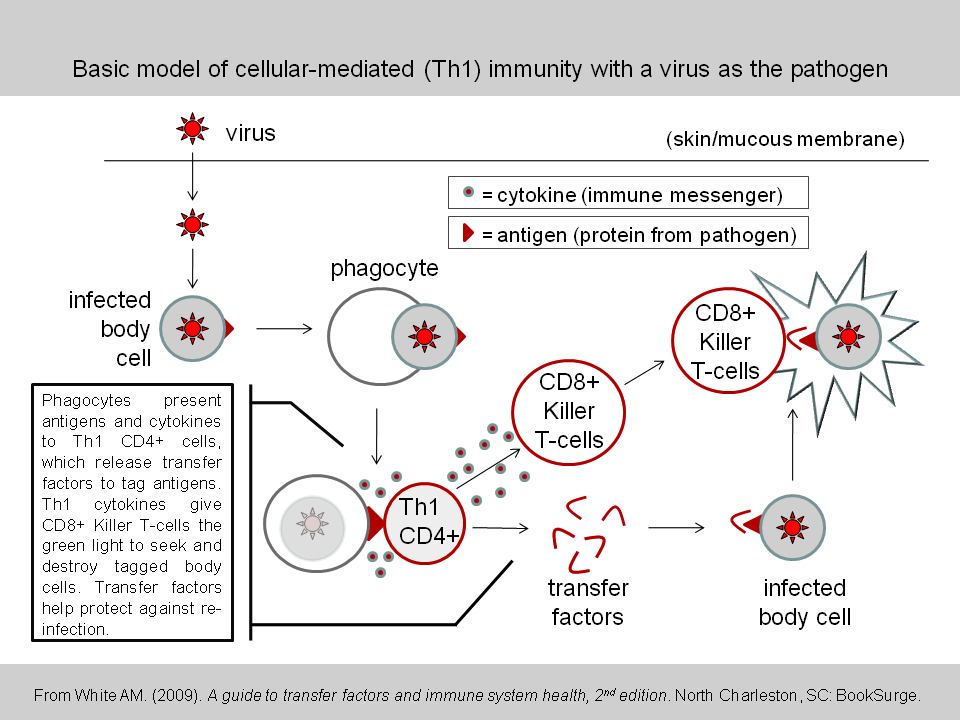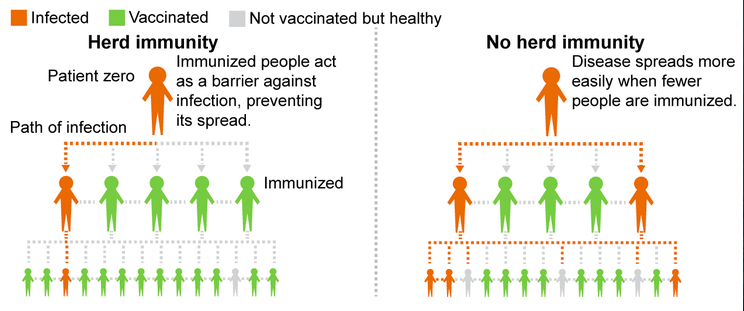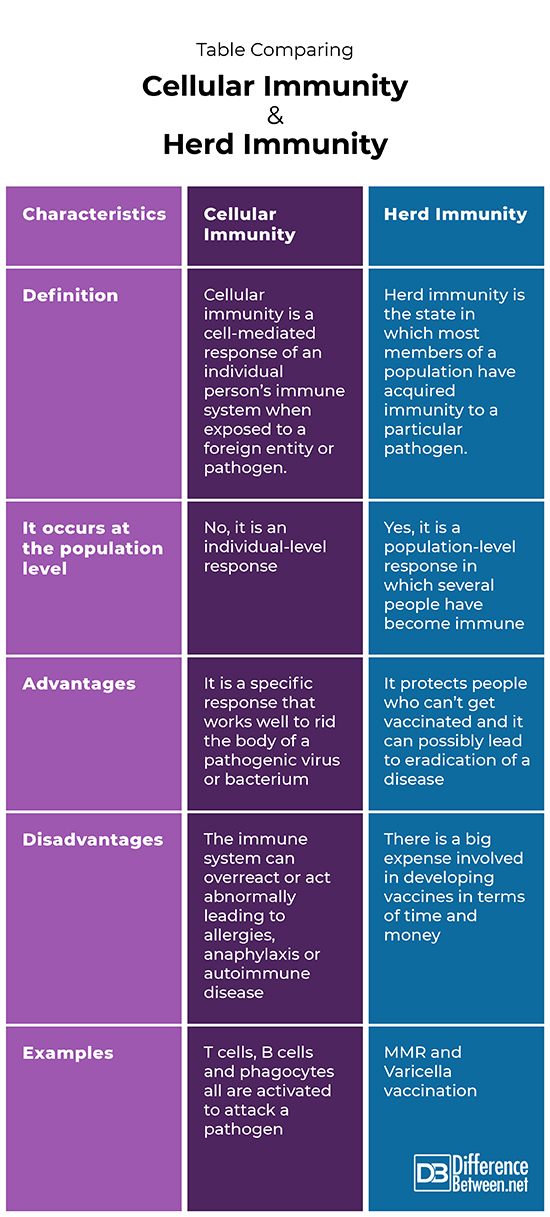Difference Between Cellular Immunity and Herd Immunity
Cellular immunity is when cells of the immune system react and respond to a pathogen. Herd immunity is when most of the individuals of a population are immune to a particular pathogen.

What is Cellular immunity?
Definition:
Cellular immunity is the process by which various immune cells are activated to respond to the presence of a pathogen, which is usually detected because of proteins called antigens that are on the pathogen.
How it works:
Cellular immunity is when the white blood cells of the body respond to some intrusion. If a pathogen is detected then cells called phagocytes and T lymphocytes are triggered to act. A series of other types of immune cells are also stimulated, including B lymphocytes which produce antibodies in response to the specific antigen of the pathogen.
Examples:
Examples of cellular immunity are the white blood cells such as phagocytes which engulf foreign particles and cytotoxic T cells which produce chemicals to kill viruses and other pathogens. B cells also make antibodies specifically to attach to the antigens of pathogens so they can be destroyed.
Advantages:
Cellular immunity is important in allowing a person’s body to recognize and respond to specific threats. Without cellular immunity a person is likely to die because the body is unable to fend off a pathogen.
Disadvantages:
A person often feels sick because of activity of the immune system, and in rare cases, the immune system goes awry and attacks healthy cells triggering autoimmune disease. Allergic responses including anaphylactic shock are also overreactions by the cellular immune system.

What is Herd immunity?
Definition:
Herd immunity is the state a population reaches when most people have developed immunity to a particular disease-causing pathogen. This can occur naturally but more typically is a result of vaccination of most of the people in the population.
How it works:
The idea is that each person who is exposed to the disease-causing pathogen, or an inactive part of the pathogen in a vaccine, develops a cellular response in which antibodies are made. This acts to protect the person if exposed to the disease agent at a later date. Herd immunity relies on many people having immunity. Herd immunity is related to cellular immunity in that it is when several people have all had a cellular response of the immune system to a specific pathogen.
Examples:
The MMR ormeasles, mumps, and rubella vaccine works well and has been given to children over many decades to the extent that there is so much herd immunity in the populations that these diseases are now rare. The Varicella vaccine has led to herd immunity among children making infant chickenpox a rare disease. The recent start of COVID-19 vaccinations hopes to achieve a similar effect in activating herd immunity in the population. By vaccinating most people against COVID-19 coronavirus, it is hoped that herd immunity will be achieved and thus morbidity and mortality will be reduced.
Advantages:
Herd immunity is useful as a way to control, and in some cases, almost eradicate disease from a population. It also helps to protect individuals who are unable to be vaccinated for one reason or another.
Disadvantages:
To achieve herd immunity against a pathogen normally means developing and producing millions of doses of vaccine. This is a time-consuming and expensive process and there is also the risk of some people having an allergic reaction to the vaccine. With the COVID-19 vaccines, a few individuals have had allergic responses, but this has been rare.
Difference between Cellular immunity and Herd immunity?
Definition
Cellular immunity is a cell-mediated response of an individual person’s immune system when exposed to a foreign entity or pathogen. Herd immunity is the state in which most members of a population have achieved a level of immunity to a particular pathogen.
It occurs at the population level
Cellular immunity does not occur at the level of a population but does occur at the level of an individual person. Herd immunity does occur at the population-level and involves many individuals.
Advantages
An advantage of cellular immunity is that there is a specific response that works well to rid the body of a pathogenic virus or bacterium. An advantage of herd immunity is that it protects people who can’t get vaccinated and it can possibly result in a disease being eradicated.
Disadvantages
With cellular immunity, the immune system can overreact or act abnormally leading to allergies, anaphylaxis or autoimmune disease. With herd immunity, there is a big expense involved in developing vaccines in terms of time and money.
Examples
Examples of cellular immunity include the action of T cells, B cells and phagocytes, which are all activated when a pathogen is detected. Examples of herd immunity include the MMR and Varicella vaccinations.
Table comparing Cellular immunity and Herd immunity

Summary of Cellular Immunity Vs. Herd immunity
- Cellular immunity and herd immunity are linked in that if cell-mediated immune responses occur in enough people to a particular pathogen then there will likely be herd immunity in a population.
- Cellular immunity is at the cell-level while herd immunity is at the population-level.
- COVID-19 mass vaccinations have begun to achieve cellular immunity in enough people that herd immunity should be achieved.
- Difference Between Rumination and Regurgitation - June 13, 2024
- Difference Between Pyelectasis and Hydronephrosis - June 4, 2024
- Difference Between Cellulitis and Erysipelas - June 1, 2024
Search DifferenceBetween.net :
Leave a Response
References :
[0]Fine, Paul, Ken Eames, and David L. Heymann. "“Herd immunity”: a rough guide." Clinical infectious diseases 52.7 (2011): 911-916.
[1]Lanzavecchia, Antonio, and Federica Sallusto. "Regulation of T cell immunity by dendritic cells." Cell 106.3 (2001): 263-266.
[2]Rashid, Harunor, Gulam Khandaker, and Robert Booy. "Vaccination and herd immunity: what more do we know?” Current opinion in infectious diseases 25.3 (2012): 243-249.
[3]Image credit: https://commons.wikimedia.org/wiki/File:Herd_Immunity_vs_Without_Herd_Immunity_.png
[4]Image credit: https://commons.wikimedia.org/wiki/File:TransferFactors.jpg
